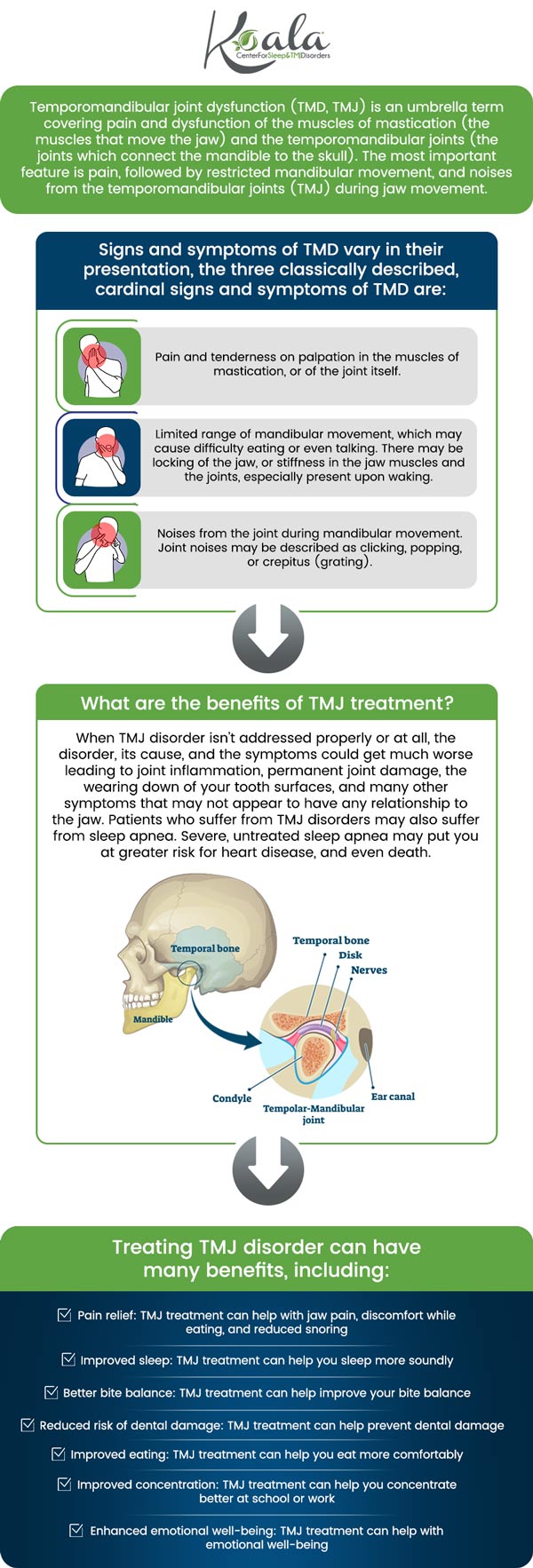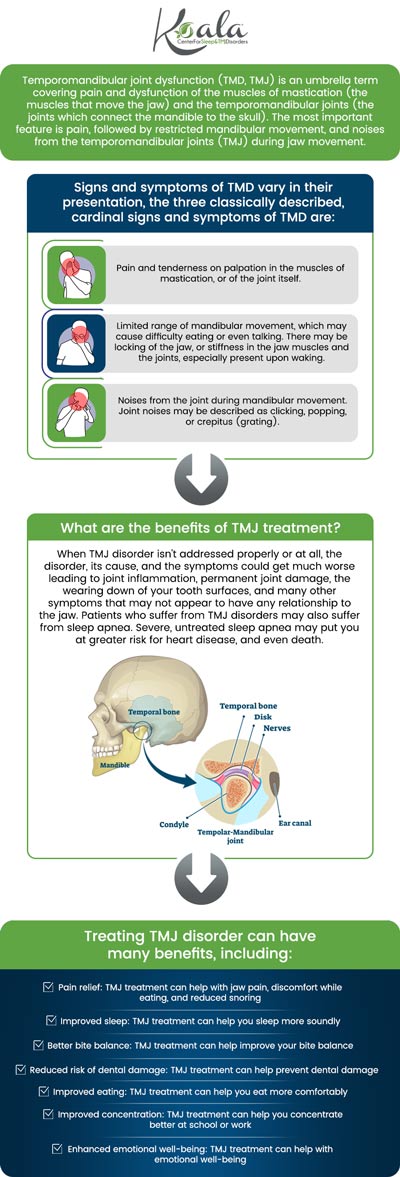Causes of TMJ (Temporomandibular Joint) Disorder Q&A
TMJ (Temporomandibular Joint) disorder can be caused by a variety of factors, including jaw injury, teeth grinding, arthritis, and misalignment of the jaw. Stress and poor posture can also contribute to the condition by causing muscle tension in the jaw area. At Koala Center For Sleep & TMJ Disorders, our specialists provide expert care to address the root causes of TMJ and develop personalized treatment plans for relief. For more information, contact us or book an appointment online. We have convenient locations across the U.S. in Bloomington IL, Peoria/Dunlap IL, El Paso TX and Wausau WI.


Table of Contents:
What are the most common causes of TMJ disorder?
Can stress contribute to the development of TMJ disorder?
How does teeth grinding lead to TMJ problems?
Are there any injuries that can cause TMJ disorder?
TMJ disorder can stem from a wide range of contributing factors, though it often develops when the jaw joint is placed under repeated strain or becomes misaligned over time. One of the more frequent causes is bite imbalance, where the upper and lower teeth don’t align properly, forcing the joint to overcompensate during basic movements like chewing or speaking. Muscle overuse, clenching, or irregular chewing patterns can also create excessive pressure in the area, gradually leading to inflammation, stiffness, or restricted movement. For some patients, the issue develops subtly until discomfort or dysfunction begins to interfere with daily habits.
Other contributing factors might include anatomical irregularities, arthritis within the joint itself, or even habits such as resting the chin in the hand or frequently chewing gum. The specialists at Koala Center For Sleep & TMJ Disorders take time to understand each individual’s full oral and medical background in order to trace where the strain might be coming from. Since the temporomandibular joint relies on the balance between the jaw, muscles, and bite mechanics, even small disruptions in alignment or function can spiral into more persistent discomfort when left unaddressed.
Stress is often a significant contributing factor to TMJ dysfunction. While emotional tension might not seem directly related to the jaw, the physical toll it can take often shows up in the form of clenched muscles, night-time grinding, or habitual jaw tightening. These responses can wear down the joint itself or put added pressure on the muscles surrounding it. When this occurs over long periods of time, the tissue can become inflamed or strained, making it harder for the joint to move freely and comfortably. In some cases, individuals dealing with high levels of daily stress aren’t aware they’re clenching their jaw at all, especially when it happens during sleep. Symptoms such as morning headaches, tightness along the sides of the face, or tension in the temples may be early signs that the body is holding stress in the jaw region. TMJ specialists are trained to recognize these patterns and develop strategies that not only relieve the discomfort but also help reduce the triggers behind it. For many patients, addressing the underlying stress alongside physical symptoms is key to long-term relief.
Teeth grinding, or bruxism, places repetitive and often excessive force on the jaw joint and the muscles that support it. This habit, whether it happens during sleep or throughout the day, pushes the temporomandibular joint beyond its normal range of function, wearing down the cushioning structures within the joint and contributing to inflammation. Over time, that constant pressure can create soreness, stiffness, or even clicking and popping as the joint struggles to move the way it should. In more advanced cases, the alignment of the teeth can shift, making everyday movements feel more strained and contributing further to the cycle. Often, individuals who grind their teeth are unaware they’re doing so until the damage begins to show. The specialists at Koala Center For Sleep & TMJ Disorders assess both the visible symptoms and the underlying movement patterns to determine how bruxism may be playing a role. From there, targeted treatment such as nighttime orthotic devices or jaw support therapies can be introduced to relieve tension and help protect the joint before further complications develop.
Injuries to the face, jaw, or the neck can also be linked to the onset of TMJ disorder. A direct blow to the area, such as during a fall, accident, or sports-related impact, can disrupt the joint’s normal alignment or damage the tissue that supports it. In some instances, the effect might not be immediately obvious. The joint may continue functioning for a while before inflammation or wear begins to surface. Once the stability of the joint is compromised, everyday movements like chewing, yawning, or speaking can become uncomfortable or difficult.
Injuries that lead to whiplash can also have an indirect effect on the jaw, particularly when the muscles of the neck and shoulders are suddenly pulled or strained. Because the jaw is so closely tied to the upper spine and surrounding muscle groups, any trauma in this area has the potential to throw the joint out of balance. For more information, contact us. We have convenient locations across the U.S. in Bloomington IL, Peoria/Dunlap IL, El Paso TX and Wausau WI.

Additional Services You May Need
▸ KoalaKIDZzz®
▸ Sleep Apnea
▸ Snoring
▸ TMJ Disorder
▸ Fatigue
▸ Sleep Disorders
▸ Weight Loss
▸ CPAP Alternative
▸ Oral Appliances




